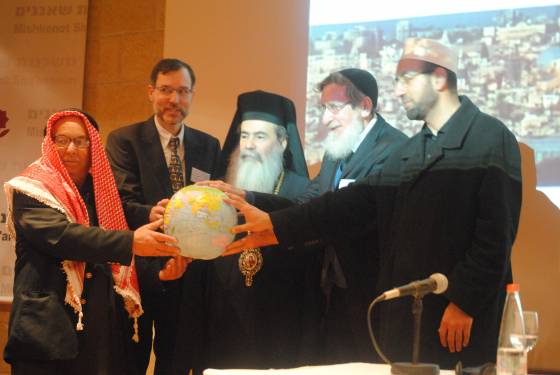 Miriam found much good will but only dawning eco-awareness in Israel’s religious leadership.
Miriam found much good will but only dawning eco-awareness in Israel’s religious leadership.
“I came today, not to say anything new – but to learn.” So the Greek Orthodox Archbishop, Dr. Elias Chacour, began the Interfaith Climate and Energy Conference that took place yesterday, March 19, in Jerusalem. The conference was organized by the Interfaith Center for Sustainable Development together with the Konrad Adenauer Foundation.
The Archbishop’s frank declaration summed up the prevalent state of eco-consciousness among the clergy: great willingness to learn, but little to go on.
The atmosphere among the 200-odd participants was optimistic. We gladly heard speeches on man’s God-sent responsibility towards creation. The Greek Orthodox Patriarch of Jerusalem, Patriarch Theophilos III, spoke movingly about the intimate relationship between creation and the Creator. Amid quotations from the Old and New Testaments and the Koran, most of what emerged from the panel of distinguished clergymen was a vision of interfaith tolerance, even brotherhood.
Sheik Muhammad Amara, Imam of Israel’s Ministry of the Interior spoke more directly of equality.
“It’s easy to gather religious leaders who tell us what we want to hear,” he said. “Truth is difficult. We can’t live in a good environment unless there is justice.”
Of ecological awareness: “Natural resources…(were put to) the service of human beings. I feel an immense responsibility. Creation is based on a finely-tuned balance. Maintain it and your life will be serene.” He added, “I wish to push back the idea of technology as our goal. Global warming, smog, and the hole in the ozone appeared as a consequence of our tyranny over the land. All of us must work together to restore balance.”
The conference’s high tone revolved around establishing the brotherhood of man and respect for the planet. Not much talk about exactly how the world’s believers can effect change. It was disappointing to perceive how little great religious leaders are involved in environmental issues.
Rabbi Ronen Lubitch, rabbi of Kibbutz Nir Etzion and lecturer at Haifa University, was possibly the most knowledgeable and pro-active of the panel speakers. He spoke of specific ecological disasters such as the effect of industrial waste on the ecology, and food security for the expanding world population. Sheik Amara and Rabbi Ronen both raised the issue of ecological education in schools.
Following the panelists’ presentations, we viewed video clips with messages from world religious leaders. Especially thrilling were the Dalai Lama’s smiling reminder that what affects the environment will ultimately affect the world’s peoples, and the late Lubavitcher Rebbe speaking in Yiddish about the mitzvah of developing solar energy. Participants then gathered into workshops on climate change and sustainable energy.
Two groups broke off from the main body of participants: a women’s workshop organized by The TRUST-Emun group and one for seminary students. While I wasn’t privileged to sit with our future religious leaders (all men), they reported that most of their efforts tended towards getting to know one another. With all the evident good will, it looks like finding common ground between a young Christian priest, Sufi theological students and future rabbis wasn’t easy.
However, the women’s group, a mixture of Christian and Jewish women, seems to have fizzed and crackled with energy. A follow-up phone conversation with moderator Elana Rozenman of the TRUST-Emun interfaith women’s group revealed a list of things each woman can do to make positive changes. Some of them: initiating clean-up and recycling days in their children’s schools; asking co-workers what each can personally do to reduce carbon emissions, and refusing to engage in consumerism.
Deputy Mayor of Jerusalem and Green Pilgrimage Ambassador Naomi Tsur told Rozenman that the Jerusalem Municipality is interested in working with Christian, Muslim and Jewish women who are active in environmental work. Naomi Tsur’s description of work cleaning up Israel’s Kidron Valley concluded the day’s activities.
And by the way – out of 45 women’s workshop participants, 5 were men.
One representative from each group presented their conclusions. All started by saying that to awake ecological consciousness in the masses of religious believers, their leaders must become educated first – starting from the top down. Equally important is starting from the bottom up: instilling a sense of responsibility for the planet in children. Faith-based schools account for 50% of the world’s students – what an opportunity for opening young minds.
If 85% of the people in the world do what they do as taught by religious leaders, these leaders should educate them in caring for the environment. But it seems that the leaders themselves need educating. Efforts such as the Lenten carbon fast are sparse.
Discussions of eco-awareness have neglected the vast influence of religious leadership. Consider: religions are the 3rd largest investment group in the world. Religions produce more newspapers and magazines than the entire European Union. Religions own 8% of the world’s habitable land. Hopefully representatives of The Interfaith Center for Sustainable Development will raise these issues at the upcoming UN Rio +20 Conference on Sustainable Development.
 Greek Orthodox Archbishop Elias Chacour calls for “a spiritual climate change.”
Greek Orthodox Archbishop Elias Chacour calls for “a spiritual climate change.”
“Care for the environment begins with our own purity and stillness,” says Greek Patriarch Theophilos III.
“Man was expelled from the Garden of Eden when he disrespected his role as steward of the world,” says Rabbi Ronen Lubitch.
Sheik Muhammed Amara said that “We must work together to restore balance.”
More interfaith eco-discussion on Green Prophet:
Photos by Miriam Kresh.
First photo, from left to right: Haj Ibrahim Abu El Hawa, Jerusalem interfaith activist; Rabbi Ronen Lubitch; Patriarch Theophilos III; Rabbi Daniel Sperber, panel moderator; Sheik Muhammad Amara.


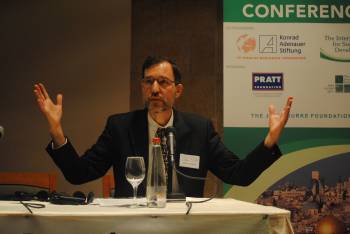
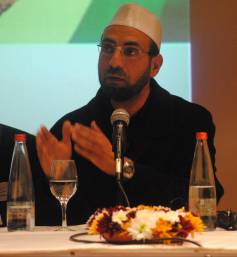
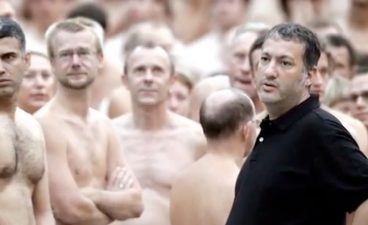
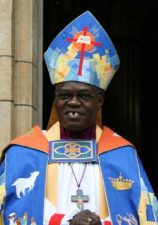

Hey!!I
great report Miriam- big thanks!
Kol hakavod to the Interfaith Center for Sustainable Development and the Konrad Adenauer Shiftung (think tank) for organizing The Interfaith Climate and Energy Conference that I was privileged to attend on March 19, at which Christian, Jewish, and Muslim clerics stressed that religious values must be applied in order to avert an impending climate catastrophe. As conference organizer Rabbi Yonatan Neril said, “Religious leaders and institutions have the potential to mobilize billions of followers and achieve sustainable development in the global struggle to curb climate change.”
On July 7, 2007, the Jerusalem Post had an article, “Israel urged to ‘act now’ or risk global warming tragedy.” The article discussed a report of the Israeli Union for Environmental Defense (Adam, Teva, v’Din) which stated that unless significant changes soon occurred, Israel would face severe problems from climate change, including: an average temperature rise of 3.3 degrees Celsius [well above the two degrees Celsius rise that climate experts say will be catastrophic]; an annual rainfall decrease of 20-30 percent, with much of the rain coming from sporadic, intense storms that will cause flooding in some areas; an expansion of the Negev desert; and a flooding of the entire coastline due to a rising Mediterranean Sea, which will cause “irreparable damage to essential infrastructure like ports and power plants, as well as residential areas along the shore.” Recent reports of severe heat waves, droughts, storms, floods, and wildfires worldwide indicate that we have very little time to make necessary changes.
Unfortunately, relatively little has been done in Israel and worldwide to try to stabilize the climate. It is time to make tikkun olam (the healing and repair of the world) a central focus of all aspects of Jewish life today, in order to help shift our imperiled world to a sustainable path.